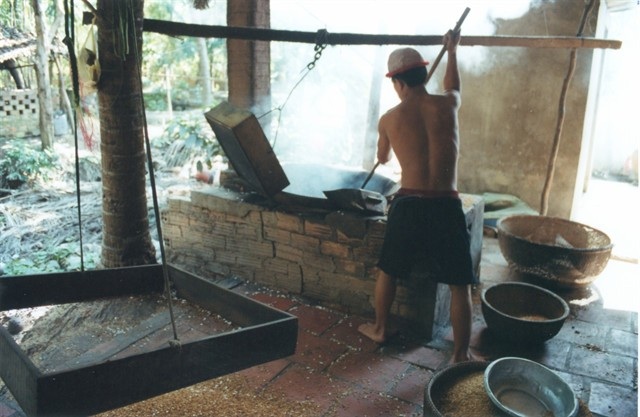
About the project
By Mia Taylor
Staff
The Patriot Ledger
VIETNAM – The bellboy at Vietnam’s Hoi An Riverside Hotel deposited my luggage in the hotel room and then paused momentarily, staring shyly. In soft, uncertain English, he asked my nationality.
After learning that I’m American, his face lit up, and his eyes projected a mixture of excitement and warmth. “Maybe soon you’ll have a new president?” he questioned.
For days, CNN had been delivering regular updates to the world about the Florida vote recount and the battle between George W. Bush and Al Gore for the White House.
Much to my surprise, this bellboy from the Vietnamese countryside went on to tell me that he and everyone he knew had been glued to CNN for 48 hours, waiting nearly as anxiously as Americans for final election results.
For a country of 78 million, whose people seem about to turn a corner in their struggle to become a prosperous, modern nation, the U.S. presidential election, I learned during a recent visit, means a great deal.
Throughout my 17-day trip, which began in the south of Vietnam and took me to the capital of Hanoi, I encountered many young Vietnamese who are intensely worried about what their country’s future will be like if Bush takes office.
Those I spoke with fear that the economic progress made during the past few years with Bill Clinton as president will be erased by Bush and that the helping hand we’ve offered will be rescinded.
In 1994, Clinton lifted a longstanding trade embargo against Vietnam. In 1995, the United States and Vietnam established diplomatic relations.
And just last year, we struck a deal to grant normal, bilateral trade relations to Vietnam. The treaty was signed four months ago and both countries’ legislatures are expected to approve it next year.
As someone whose father fought in the Vietnam war, I know firsthand of the bitterness many in this country still feel toward Vietnam. My father did not want me to go to Vietnam because of his lingering resentment toward the Vietnamese people. To him Vietnam is a very bad memory and he did not want me to experience some of the horrors he did. The horrors are long past, but he cannot forget.
What I saw, unlike what my father experienced, was a truly beautiful country, full of promise and full of hard workers eager to put the harsh realities of the past and their current daily life behind them.
Today in Vietnam a 24-year-old tour guide, with a college education and three years of job experience, earns $250 a month.
Young couples cannot afford their own apartments on such wages and as a result continue to live with their parents, sharing a bedroom with other married siblings n separated only by a sheet.
Though such living arrangements have much to do with custom, I talked to many twenty-somethings who also say such conditions continue because of harsh economic realities.
Many young Vietnamese educated to be lawyers or engineers simply cannot find jobs because the economy has not expanded as fast as the population. So, they work for between $1 and $2 an hour,
bicycling tourists or locals around on “cyclos.”
I saw many people with a missing leg or arm or paralyzed in some way from land mines that are still exploding 25 years after the Vietnam War ended.
Despite such hardships, the Vietnamese remain an incredibly happy, industrious people. Their spirit and zest for life shines through in everything they do. Vietnamese of all ages work from sunup to sundown and beyond, tending fields, running their own stores, walking the streets selling produce or products they’ve made by hand.
The elders rise between 4and 5 a.m. and congregate on the sidewalks and riverfronts playing badminton together or performing Tai Chi n laughing and smiling throughout.
Throngs of kids gather on the street, laughing and playing kickball. Young adults often pause from their business and join in the games. And a regular street sight is a whole family sitting around playing cards, or teens playing chess or checkers. As I passed people on the streets of Ho Chi Minh city women and men, young and old stop what they are doing, smile broadly and muster their English skills to blurt “Hello.”
My final days in Vietnam coincided with Clinton’s historic visit.
One evening I walked out of my hotel to find rows of Vietnamese people, 10 deep, lining the sidewalks around a building Clinton was visiting. They stood silently, hoping for a glimpse of the first American president to visit Hanoi. The excitement in the air was palpable.
Because of the establishment of diplomatic relations, more American tourists are visiting the country and bringing with them valuable American dollars, not to mention the fact that our presence creates jobs.
The Vietnamese Communists are wrestling with the economic liberalization now taking place, which also implies political reform.
The morning I left Vietnam, a 23-year-old Vietnamese boy named Phuc n whose name means happiness n arrived at my hotel to drive me to the air-port. During the 40-minute drive he spoke
animatedly about how he had been watching CNN for two days to hear all Clinton had to say while visiting Vietnam.
He also spoke excitedly about his country’s future and the possibility of it someday being a capitalist system.
When asked if he wanted to leave his country and come to America like so many other Vietnamese have done, he said no.
Maybe he’ll visit the United States someday, but Phuc thinks his country is full of promise right now.
And I can’t help but hope that is true.
Mia Taylor is a member of The Patriot Ledger staff.
